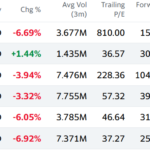WTI futures were lower during early trade in Europe today, while Brent was steady. Both contracts were set for weekly losses, as the past few days saw Libya increase its production and exports outlooks dramatically, while the US reported rising gasoline supplies amid peak driving season.
West Texas Intermediate futures for settlement in August traded for $102.75 per barrel at 5:54 GMT on the New York Mercantile Exchange, down 0.17%. Prices ranged from $102.92 to $102.68 per barrel. The US contract added 0.63% on Thursday, and so far this week has lost about 1%.
Meanwhile on the ICE in London, Brent futures due in August stood for a 0.07% drop at $108.59 per barrel. Daily high and low stood at $108.74 and $108.49 per barrel, respectively. Brent’s premium to WTI stood at $5.84, after last session’s closing margin of $5.74. The European contract added 0.36% yesterday, and has lost more than 1.5% so far this week.
“The increased production in Libya with the opening of two ports has given downward pressure to oil,” Hong Sung Ki, commodities analyst at Samsung Futures Co. in Seoul, said for Bloomberg. “The market has been removing a risk premium of about $5 a barrel since mid-June from the Iraq situation.”
US oil inventories
The US Energy Information Administration (EIA) posted its weekly oil inventories report for the seven day through July 4 on Thursday. The log revealed a 2.370 million-barrel draw for commercial crude oil inventories, gasoline inventories added 0.579 million barrels, while distillate fuels stockpiles levels increased by 0.227 million barrels.
“Yesterday’s weekly oil inventories showed lower-than-expected gasoline demand,” Michael Poulsen, analyst at Global Risk Management Ltd. in Middelfart, Denmark, said in a report yesterday, cited by Bloomberg. It’s “a surprise since the summer driving season is presently peaking.”
Oil at Cushing, Oklahoma, the delivery point for the NYMEX contract and the largest hub in the US, was reported at 20.9 million barrels for a 0.4 million-barrel gain, after a drop of 1.3 million was logged for the previous week. Meanwhile, hubs at the Gulf Coast saw 4.2 million barrels drawn, after a further 3 million drop was reported last week.
“Inventories at Cushing increased unexpectedly and WTI is reacting to that,” said for Bloomberg Amrita Sen, chief oil markets analyst at consultant Energy Aspects Ltd. “The stockpile increase came as a result of reduced flows out of Cushing on the Seaway pipeline following a two-day outage.”
Libya
Libya will begin to gradually increase exports through the two reclaimed terminals to avoid disrupting oil markets, Samir Kamal, the nation’s governor to OPEC, said yesterday according to Bloomberg.
The National Oil Company was told to start marketing supplies from the two terminals earlier this week.
The Es Sider and Ras Lanuf facilities are Libya’s biggest and third-biggest ports, and have a combined potential exporting capabilities of more than 0.5 million barrels per day. The rebels who had occupied the ports have handed them over to the newly elected government as a sign of support.
Libyas output totaled 350 000 barrels per day yesterday, more than double the figure from a month ago, Mohamed Elharari, a spokesman at National Oil Corp., said yesterday, according to Bloomberg.
Meanwhile, a pipeline from the Sharara field was also reclaimed on Tuesday. The deposit has a 300 000 barrels per day capacity.
Technical view
According to Binary Tribune’s daily analysis, in case the West Texas Intermediate August future on the NYMEX breaches the first resistance level at $103.44, it probably will continue up to test $103.94. Should the second key resistance be broken, the US benchmark will most likely attempt to advance to $104.89.
If the contract manages to breach the first key support at $101.99, it will probably continue to drop and test $101.04. With this second key support broken, the movement to the downside will probably continue to $100.54.
Meanwhile, August Brent on the ICE will see its first resistance level at $109.11. If breached, it will probably rise and probe $109.56. In case the second key resistance is broken, the European crude benchmark will probably attempt to advance to $110.23.
If Brent manages to penetrate the first key support at $107.99, it will likely continue down to test $107.32. With the second support broken, downside movement may extend to $106.87 per barrel.





